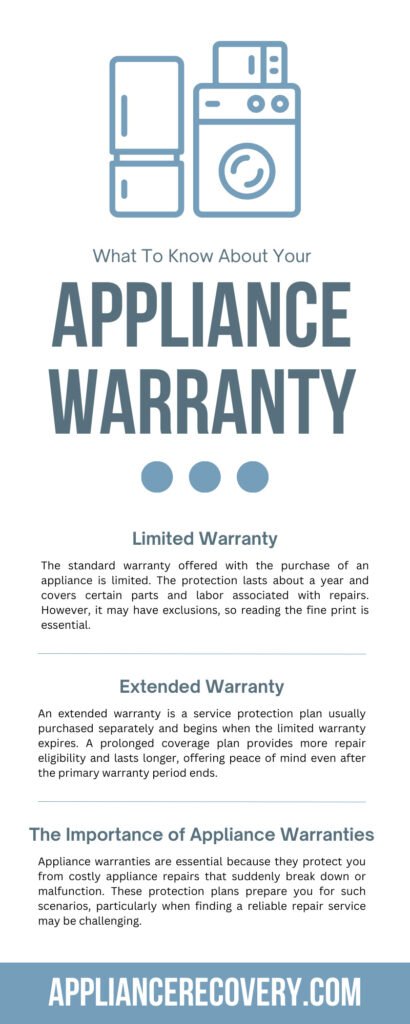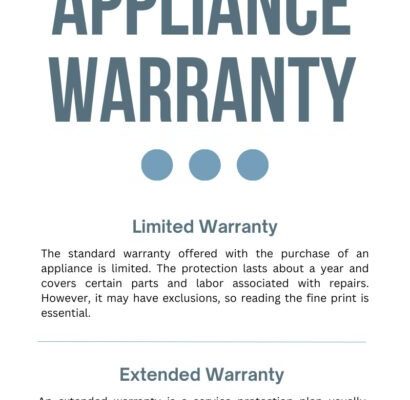
Here’s the thing: transferring a warranty on a GE kitchen appliance isn’t as simple as passing the remote at a family movie night. Some brands make it seamless; others, not so much. GE has its own rules, and sometimes those rules are tucked into fine print most people ignore until something actually breaks. Let me walk you through how it works, what you need to watch out for, and why it matters—because the last thing you want is to find out your “covered” oven is suddenly on its own.
What Does a GE Kitchen Appliance Warranty Cover?
Before you worry about transferring anything, it helps to know *exactly* what a GE appliance warranty actually does. Most GE kitchen appliances—whether it’s a gleaming new stove or a trusty old refrigerator—come with a limited warranty straight from the manufacturer. This warranty typically covers:
- Defects in materials and workmanship—which means if something was wrong when it left the factory, you’re not on the hook for repairs.
- Parts and labor for a certain period (usually one year for most kitchen appliances).
- Additional coverage on specific parts (for example, some compressors in fridges get extra time).
But here’s the fine print: “Limited” is the key word here. The warranty doesn’t cover accidental damage, normal wear and tear, or problems caused by improper installation. If you try to fix the appliance yourself without following GE’s troubleshooting code, or hire someone who isn’t authorized, you could void the warranty entirely.
So, in a nutshell, the GE kitchen appliance warranty is a solid safety net—but only if everything is by the book. And that leads us to the big question: can you hand that net off to the next person?
Are GE Appliance Warranties Transferable?
You might be wondering, “Can I just transfer my GE warranty to the new owner if I sell or gift my appliance?” Here’s where things get interesting—and a little bit confusing. With most standard GE warranties (the kind that come automatically with a new purchase), the answer is usually no. These warranties are meant for the original purchaser only.
That means if you bought a brand-new GE dishwasher and then sold your house, the buyer wouldn’t automatically get your warranty coverage. The warranty is “tied” to you, not to the appliance itself. It’s kind of like a non-transferable concert ticket; great for you, but not something you can hand off to a friend at the last minute.
But—and there’s always a but—there are a few exceptions. Some extended warranties, like GE’s own Service Protection Plans or third-party coverage, might be transferable. Transferring these usually involves filling out a form, notifying the provider, and providing proof of the sale or transfer. Every plan is a little different, so you always need to check the paperwork or call the customer service line (yes, even if waiting on hold isn’t your favorite thing).
How To Check If Your GE Appliance Warranty Is Transferable
Let me explain how you can figure this out without pulling your hair out. First, you need to identify the kind of warranty your GE kitchen appliance has. Look for:
- Original manufacturer warranty (the basic one-year plan from GE)
- Extended warranty from GE or a third-party provider (sometimes called a service protection plan or extended service agreement)
Here’s what usually works:
If you still have the warranty paperwork, flip to the small print section titled “Transferability” or “Ownership.” If it’s not mentioned, odds are it’s *not* transferable.
If your warranty is through a third party (like a big-box retailer), check their website or call their customer support. Some retailers allow you to transfer coverage for a small fee, but you usually have to notify them within a certain number of days after selling the appliance.
And if you can’t find the info, don’t be shy about calling GE’s customer support line. They’ll ask for the appliance’s model and serial number, and can tell you right away if your coverage can go with the new owner or not.
How To Transfer a GE Appliance Warranty (If Possible)
Let’s say you discover your GE warranty is transferable (lucky you!). Here’s what you’ll usually need to do:
- Contact the warranty provider—this could be GE directly or a third-party plan holder.
- Gather key information including the model, serial number, current owner’s details, and new owner’s details.
- Fill out a transfer form, usually available online as a PDF or through customer service.
- Submit proof of purchase or transfer (such as a bill of sale or sales receipt).
Some plans might require a transfer fee—usually not more than $25–$50. And don’t forget: timing matters. Many plans have a short window after the sale (sometimes just 30 days) where you can request a transfer. Miss it, and you’re likely out of luck.
Honestly, this process can be a bit fiddly, and it’s easy to miss a step if you’re not organized. Setting a reminder or keeping all your appliance codes, receipts, and paperwork together can save a lot of headache down the road.
What If The Warranty Can’t Be Transferred?
If you find out your GE appliance warranty — especially the standard one that came with the appliance — can’t be transferred, don’t panic just yet. The new owner isn’t necessarily out in the cold. Here’s why:
- Many GE kitchen appliances are built to last, so outside of that first year, they often run smoothly with basic maintenance.
- Aftermarket or extended warranties are sometimes available for purchase by the new owner, especially if the appliance is still relatively new and in good working order.
- DIY troubleshooting is always an option. GE provides online manuals, battery codes for small resets, and basic sync or reset tips for many models.
For big repairs, some folks just choose to pay out-of-pocket—especially if it’s a one-time issue. But it’s always worth checking if the original warranty provider has any out-of-warranty service plans. Sometimes, you can purchase peace of mind, even after the fact.
Alternatives To GE’s Standard Warranty Coverage
If warranty transfer isn’t in the cards, it might be time to consider other options:
- Third-party extended warranties. Companies like SquareTrade or Assurant allow new owners to buy coverage for eligible appliances—even if the original GE warranty is up.
- Home warranty plans. If the GE appliance is sold as part of a home, some buyers opt for a home warranty from providers like American Home Shield, which can cover appliances regardless of age or original ownership.
- Universal appliance service plans. These can sometimes offer coverage on a wide range of appliances, even if you don’t know the original purchase date or battery code for a smart device.
Each of these comes with its own fine print. Coverage amounts, exclusions, and transfer policies can all be different. As a buyer, it’s worth reading through the terms carefully (or at least skimming the biggest details), especially if you’re counting on the plan for serious troubleshooting or major repairs down the line.
Why Warranty Transfer Matters When Buying or Selling Used GE Appliances
Here’s why people get so worked up about transferable warranties: it’s all about *peace of mind*. If you’re a buyer, getting an appliance with an active, transferable warranty can save you a lot of financial stress. If something breaks, you can call for service, get parts replaced, or even have the whole unit swapped out—without reaching for your wallet.
For sellers, being able to advertise a transferable GE kitchen appliance warranty can actually raise the resale value. It’s like selling a used car that’s still under warranty; buyers feel more secure making the deal. On the flip side, if the warranty isn’t transferable, being upfront about it helps build trust, and gives buyers a realistic sense of what they’re getting.
Think of it as an extra “code” of confidence—one that makes a used appliance feel almost as secure as a new one. But if it’s not possible, honesty and clarity are the next best things.
Troubleshooting Steps If Warranty Issues Arise
Let’s say you—or the new owner—run into trouble with a GE kitchen appliance, and the warranty status is uncertain. Here’s a slow, step-by-step approach to figuring out what to do next:
- Find the model and serial numbers—these are usually on a sticker inside the appliance door or on the back, and are essential for any service request.
- Check the purchase date. If it’s been less than a year, you might still be eligible for some kind of manufacturer help.
- Contact GE customer support with all your information in hand. Be ready to explain the situation—transfers, new ownership, and any troubleshooting codes you’ve already tried.
- Ask about out-of-warranty service. Even if the warranty can’t be transferred, GE and many trusted retailers offer paid service visits, battery swaps, or replacement parts.
Don’t try to “reset” or open up a complex appliance just to fix things quickly; you might accidentally void any support you do have left. And if the appliance has smart or sync features, double-check the manual for special reset or connection steps.
Final Thoughts: Navigating Warranty Transfers With GE Kitchen Appliances
Transferring a warranty on a GE kitchen appliance isn’t always as easy as passing along a remote or a code to sync up your new device. In most cases, the standard manufacturer warranty is *not* transferable—unless you purchased a specific extended plan that explicitly allows it. But that doesn’t mean you’re out of luck. With a little research, clear communication, and some creative alternatives (like third-party or home warranty plans), you can still buy or sell a used GE appliance with confidence.
At the end of the day, understanding the ins and outs of GE kitchen appliance warranty transfers comes down to reading the fine print and not being afraid to ask questions—even if the answers are buried in legalese. Whether you’re the buyer or the seller, you’ll be better prepared, which usually means one less thing to worry about when your next big repair (or upgrade) comes along.
